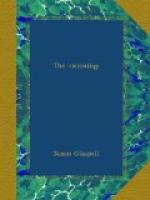“But, Aunt Kate,” he cried, “mama told me that God made me!”
“Why so He did, Worthie—that is, I suppose He did—but He didn’t just make you out of nothing.”
He lay there on the grass in silence for a long time, looking at the world about him—thinking. After a while he was singing a little song. This was the song:
“Once I was a little worm—
Long—long—ago.”
Katie smiled in thinking how scandalized Clara would be to have heard the story just told her son, story moving him to sing a vulgar song about having been a horrid little worm. It would be Clara’s notion of propriety to tell Worth that the doctor brought him in his motor car and expect his mind, that wonderful, plastic little mind of his, to be proper enough to rest content with that lucid exposition of the wonder of life.
The time was near for Clara’s six months of Worth to begin. Katie had promised she would bring him to her wherever she was; and Clara was in Paris and meaning to remain there. It meant that Worth would spend the winter in Paris, away from them; from time to time—as the custom of the city dictated—he would be taken for perfunctory little walks in the Bois and would be told to “run and play” if he asked indelicate questions concerning the things of life.
In the light of this story of the ways of growth the arrangement about Worth seemed an unnatural and a brutal thing.
She did not believe that, as a matter of fact, Clara wanted Worth. The maternal passion was less strong in Clara than the passion for lingerie. But she wanted Worth with her for six months because that kept him from Wayne and Katie for six months and she knew that they did want him.
The poor little fellow’s summer had not been what Katie had planned. Part of the time he had been with his father and part of the time with her—that thing of division again, and as neither of them had been happy any of the time Worth had had to suffer for it. He seemed to have to suffer so much through the fact that grown-up people did not know how to manage their lives.
Suddenly he sat up. “Aunt Kate,” he asked, “when’s Miss Ann coming back?”
“I don’t know, dear.”
“Well where is she?”
“She’s been—called away.”
“Well I wish she’d come back. I like Miss Ann, Aunt Kate.”
“Yes, dear; we all do.”
“She tells nice stories, too. Only they’re about fairies that are just fairies—not worms and things that are really so. Do you suppose Miss Ann knows, Aunt Kate, that she used to be a frog?”
Katie laughed and tried to elucidate her point about the frog. But she wondered what difference it might not have made had Ann known that, as Worth put it, she used to be a frog. With Ann, fairy stories would have to be about things not real. All Ann’s life it had been so. It suddenly seemed that it might have made all the difference in the world had Ann known that the things most wonderful were the things that were.




